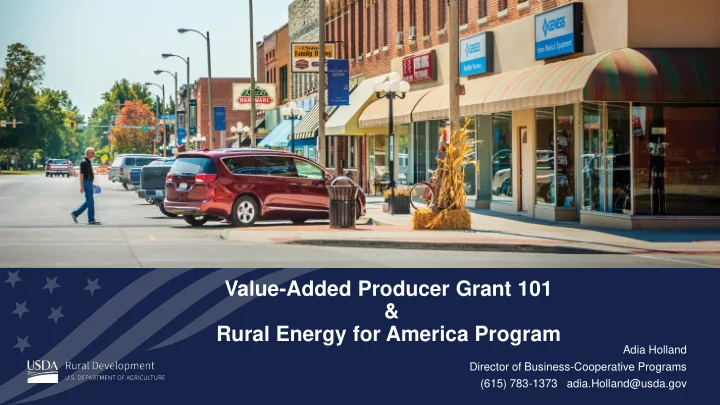

Value-Added Producer Grant 101 & Rural Energy for America Program Adia Holland Director of Business-Cooperative Programs (615) 783-1373 adia.Holland@usda.gov
Value-Added Producer Grant Authorization Section 231 of the Agriculture Risk Protection Act of 2000 (P. L. 106-224), as amended by section 6203 of the Agricultural Act of 2014 (P. L. 113-79) (see 7 U.S.C. 1632a) Program Regulation Final Rule 7 CFR part 4284 subpart J published May 8, 2015 2/3/2020 2
Purpose of the Value-Added Producer Grant Provides funds for economic planning activities or eligible working capital expenses to enable viable Agricultural Producers to develop businesses that produce and market Value-Added Agricultural Products to create marketing opportunities for such businesses. 2/3/2020 3
What Value-Added Producer Grant is NOT • A technical assistance program • A job training program • Intended to teach people how to farm • Intended as a continuous stream of capital 4
Local Agriculture Market Program (LAMP) VAPG now operates under LAMP. What does this mean?
Local Agriculture Market Program Coordinates the functions of the Farmers Market and Local Food Promotion Program (FMLFPP) and the Value-Added Producer Grant Program (VAPG). Intended to encourage USDA to utilize administrative efficiencies and increase coordination between Rural Development (RD) and Agricultural Marketing Service (AMS). Each program’s statutory authority, mission, grant priorities and activities remain independent. 6
Local Agriculture Market Program Adds a focus on funding food safety-related expenses such as certifications, training, and limited equipment as a market development tool, through- A reserve of not more than 25 percent of available funds for food safety- related projects. Makes an exception to the $5,000 equipment limitation by adding a $6,500 ceiling for food safety equipment. 7
Local Agriculture Market Program Emphasizes simplification of the application process… Tweaks “Majority Controlled Producer - Based Business” with language on what constitutes an ‘entity.’ Changes the rollover date for Reserves from June 30 to September 30. Adds application requirement of a statement on expected direct and indirect benefits of the project. 8
Value-Added Producer Grant Key Details • National Competition • FY2019 and FY2020 Available Funding: ~ $60Million • Application Deadlines: Paper: March 10,2020 Grants.gov: March 5, 2020 • Maximum Award Amounts: $75,000 Planning $250,000 Working Capital • Matching Requirement: 1-to-1 match (50 percent of total project costs) cash or eligible in-kind contributions to be used only for eligible project purposes. • Grant Period: Up to 36 months, depending on project complexity
Funding Priorities Reserved Funds • Beginning & Socially Disadvantaged Farmers and Rancher • Veteran Farmer or Rancher • Mid-Tier Value Chains • Small or Medium Size Family Farm or Ranch • Persistent Poverty Counties *Reserved funds ensure that a minimum of 10 percent of total funds are available for awards to applicants from these categories.
Applicant Eligibility • There is NO rural requirement -Neither the applicant or the value-added process has to take place in a rural area • Eligible Applicants must be Agricultural Producers - “An individual or entity that produces an Agricultural Commodity through participation in the day-to- day labor, management, and field operations . . .” (In the Application Template, Section 4.2, all applicants must: “ Describe your involvement in day-to-day production of the raw commodity and how you meet the definition of Agricultural Producer in the program regulation at 4284.902”) • Must meet the definition of one of four applicant types: -Independent Producers -Agricultural Producer Groups -Farmer or Rancher Cooperatives -Majority-Controlled Producer-Based Business
Eligibility All four Applicant Types Must: • Currently produce and own more than 50 percent of the raw commodity that will be used for the Value- Added product. • Own the product from its raw commodity state through the production of the Value-Added product during the Project. Project Eligibility • Value-added product methodology • Expansion of customer base • Increased revenue from the process returned to the producer
Five Value-Added Methodologies • Change in physical state • Produced in a manner that enhances the value of the agricultural commodity • Physical Segregation • Farm- or ranch-based renewable energy • Locally-produced agricultural food product 13
Hemp • Must be grown in accordance with the 2018 farm bill. It cannot be grown in accordance with the 2014 farm bill or any state issued licenses. • Please see AMS website for listing of states with approved plans. Status of State and Tribal Hemp Production Plans 14
All Applicants Must Demonstrate: • Increase in customer base • Greater portion of revenue derived from the value-added process returned to the producer 2/3/2020 15
Two types of VAPG Grants 1) Planning Grant • To pay a qualified (third-party) consultant for development of feasibility, marketing, business plan related to the processing and/or marketing of a value-added product. 2) Working Capital Grant • To pay eligible project expenses related to the processing and/or marketing of value-added product. 16
Tools for Applicants Comprehensive Toolkits for Planning and Working Capital Outreach Fact Sheets • General program information • Locally-produced food • Harvesters • Mid-Tier value chains 17
Program Information & Materials • https://www.rd.usda.gov/programs-services/value-added-producer-grants/tn 18
Claybrook Farm – Covington, Tennessee 19
Delta BioRenewables, LLC – Memphis, Tennessee 20
Nicole Riddle – The Winery at Seven Springs Farms Maynardville, Tennessee 21
Ethan Gouge- Roan Highlands Farm Roan Mountain, Tennessee 22
State Contacts 23
For r more in information and su support plea lease contact your lo local are rea off ffice or r the state offic ffice below Adia Holland Director of Business-Cooperative Programs USDA Rural Development (615) 783-1373 Adia.Holland@usda.gov
Recommend
More recommend